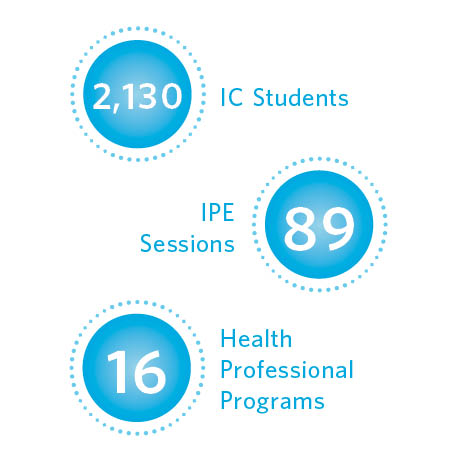 The Integrated Curriculum is a flagship program for UBC Health and a key mechanism through which programs are preparing their students for the workforce of tomorrow, which is increasingly incorporating team-based models of care. Delivered in partnership with 16 health professional programs at UBC, the Integrated Curriculum continues to offer meaningful opportunities for students to learn with, from, and about each other, while discussing topics that benefit from a collaborative approach, such as professionalism, ethics, and health informatics. The program is delivered in collaboration with the Centre for Excellence in Indigenous Health and incorporates a series of interprofessional modules and workshops focused on Indigenous cultural safety.
The Integrated Curriculum is a flagship program for UBC Health and a key mechanism through which programs are preparing their students for the workforce of tomorrow, which is increasingly incorporating team-based models of care. Delivered in partnership with 16 health professional programs at UBC, the Integrated Curriculum continues to offer meaningful opportunities for students to learn with, from, and about each other, while discussing topics that benefit from a collaborative approach, such as professionalism, ethics, and health informatics. The program is delivered in collaboration with the Centre for Excellence in Indigenous Health and incorporates a series of interprofessional modules and workshops focused on Indigenous cultural safety.
In 2021/22, UBC Health continued to navigate the complexity of delivering an interactive interprofessional program online within the context of the COVID-19 pandemic. Despite the challenges with providing this type of program virtually, the pandemic also presented some unique opportunities that will inform future iterations of the Integrated Curriculum.
The program’s online delivery made it possible for patients and community members to facilitate one of the workshops, bringing lived experiences that engaged students throughout team discussions. The online delivery also enabled the interprofessional participation of students at distributed sites across BC. As health professional programs are increasingly training students in rural and underserved communities to improve access and health equity, UBC Health is committed to ensuring students at all sites can experience interprofessional learning opportunities.
With a commitment to inclusive excellence, UBC Health will begin a curriculum renewal process in 2022/23 that will enhance the learning, scalability, and sustainability of the Integrated Curriculum.
Strategic Objectives
The Integrated Curriculum advances the following UBC Health strategic objectives:
- Education innovation: Renew classroom-based and develop practice-based curricula, reinforced by scholarship in health education
- Public and patient engagement: Expand engagement to advance diverse community priorities, enhance learner experiences, and align research activities
Posted October 24, 2022